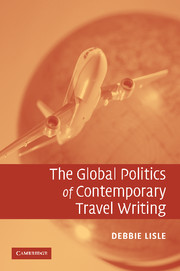Book contents
- Frontmatter
- Contents
- List of illustrations
- Preface
- ‘Travelogue’
- 1 Introduction: the global imaginary of contemporary travel writing
- 2 Between fact and fiction: the generic boundaries of travel writing
- 3 The cosmopolitan gaze: rearticulations of modern subjectivity
- 4 Civilising territory: geographies of safety and danger
- 5 Looking back: utopia, nostalgia and the myth of historical progress
- 6 Engaging the political: contemporary travel writing and the ethics of difference
- Bibliography
- Index
5 - Looking back: utopia, nostalgia and the myth of historical progress
Published online by Cambridge University Press: 22 September 2009
- Frontmatter
- Contents
- List of illustrations
- Preface
- ‘Travelogue’
- 1 Introduction: the global imaginary of contemporary travel writing
- 2 Between fact and fiction: the generic boundaries of travel writing
- 3 The cosmopolitan gaze: rearticulations of modern subjectivity
- 4 Civilising territory: geographies of safety and danger
- 5 Looking back: utopia, nostalgia and the myth of historical progress
- 6 Engaging the political: contemporary travel writing and the ethics of difference
- Bibliography
- Index
Summary
More than space, then, it is in time that Lonely Places are often exiled, and it is their very remoteness from the present tense that gives them their air of haunted glamour. The door slams shut behind them, and they are alone with cobwebs and yellowed snapshots, scraps of old bread and framed photographs of themselves when young.
Pico IyerIyer's argument that Lonely Places are forever backward looking repeats Lowenthal's famous claim that the past is a foreign country. Indeed, Iyer goes on to say that ‘you wind back the clock several decades when you visit a Lonely Place’, and thus locates countries like Paraguay, North Korea and Argentina outside of the modern ‘MTV and CNN circuit’. While Iyer caricatures Lonely Places in terms of their eccentricity (they are ‘dotty’ and ‘queer’), his argument dovetails nicely with the spatial assumptions of travel writing; indeed, geographical hierarchies (e.g. home/away; safe/dangerous; civilised/primitive) make no sense without their attending historical dimensions. This chapter analyses how the geographical imagination reproduced by contemporary travel writing is shaped by a particular – and problematic – understanding of history. Because contemporary travel writing maps global territory through a historical timeline that is linear, evolutionary and progressive, certain destinations are located father back in time than others. The most helpful way to think about this conjunction of space, time and travel is through Doreen Massey's image of the ‘historical queue’.
- Type
- Chapter
- Information
- The Global Politics of Contemporary Travel Writing , pp. 203 - 259Publisher: Cambridge University PressPrint publication year: 2006



